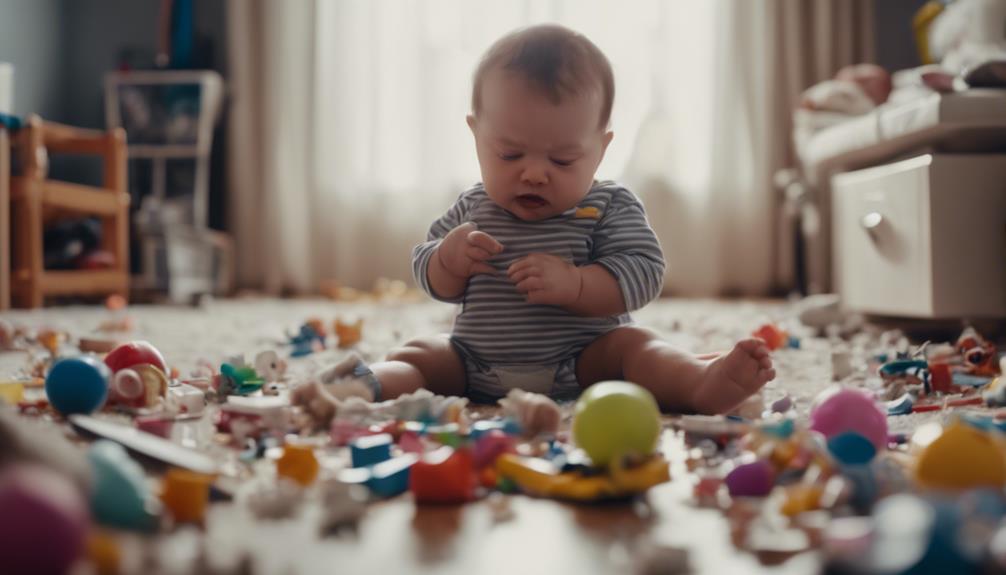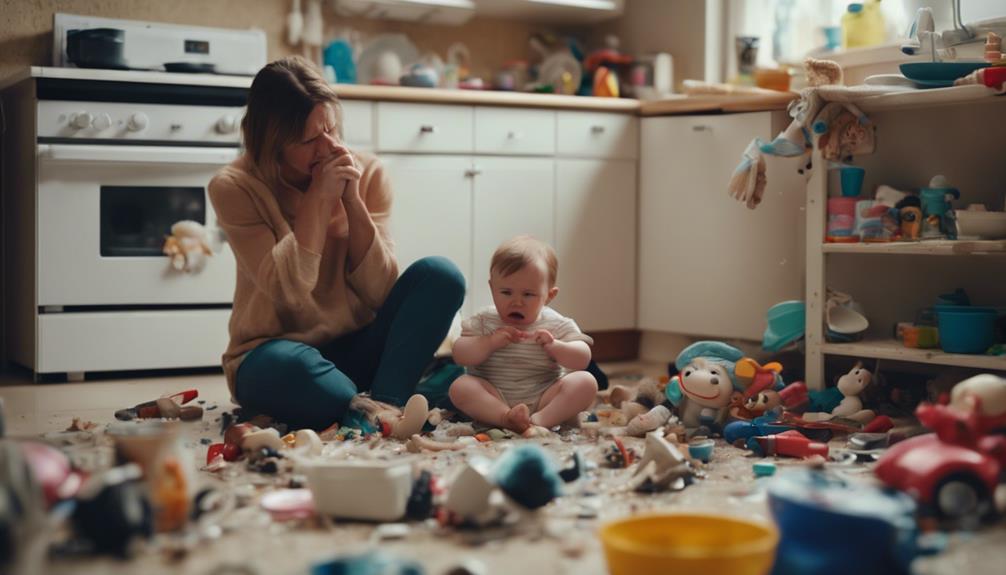To experience happiness and well-being with your precious baby, it is important to embrace the significance of baby bliss in your own satisfaction. Cherish moments of skin-to-skin contact for emotional bonding and brain development. Witnessing developmental milestones can bring joy and help build a strong foundation for the parent-child relationship. Be prepared for challenges by balancing responsibilities and maintaining self-care routines. Coping strategies are essential for navigating parenthood obstacles and preserving your happiness. Recognize both the highs and lows of the journey, making self-care a priority to rejuvenate. Remember that understanding the complexities of parenting can lead to a rewarding experience with your little one.
Key Takeaways
- Experiencing baby bliss boosts happiness and life satisfaction post-baby.
- Skin-to-skin contact fosters emotional connection and brain development.
- Understanding challenges helps appreciate joyful moments and cope with struggles.
- Prioritize self-care activities to maintain well-being post-baby.
- Tailor support for new parents based on individual needs for long-term happiness.
The Impact of Baby Bliss
Experiencing baby bliss can bring about a significant increase in happiness and life satisfaction during the first year after your baby's birth. Particularly in the first six months, moments of joy and contentment can be profound as you bond with your little one.
Skin-to-skin contact, a practice where you hold your baby against your bare chest, not only fosters a strong emotional connection but also plays an essential role in their brain development by promoting feelings of security and warmth.
During this period, the sheer delight of watching your baby grow and hit developmental milestones can be incredibly rewarding. The positive impact on your well-being is palpable as you witness their first smile, hear their first giggle, and feel the warmth of their tiny fingers wrapped around yours.
These early experiences of baby bliss lay a foundation for a strong parent-child relationship and set the stage for a fulfilling parenting journey ahead.
Challenges of Parenting Happiness

Parenting happiness comes with its fair share of challenges, requiring you to navigate through parenting struggles while working towards finding a delicate balance.
Despite the difficulties, there are moments of joy that make the journey worthwhile.
Understanding these challenges can help you better appreciate the joyful moments and cope with the struggles along the way.
Parenting Struggles
Managing the challenges of parenting can greatly influence your happiness and well-being over time. When your baby is one, it's crucial to make sure you're prepared for the hurdles that may come your way.
Research indicates that there's a good reason to be cautious as while parental happiness and life satisfaction typically increase in the first year post-baby, anger levels can rise substantially after five years of parenthood. This can lead to a decrease in your overall well-being as the demands of parenting accumulate.
Mothers often experience a more substantial boost in happiness compared to fathers at the beginning, but these short-term positive effects can diminish over time. Understanding these nuances and gender differences in parental well-being can help tailor support and interventions for new parents, ensuring a more sustainable level of happiness and well-being throughout the parenting journey.
Finding Balance
To maintain a sense of equilibrium in your life while maneuvering through the challenges of parenting happiness, it's essential to find a harmonious balance between your responsibilities and self-care practices.
Parenthood brings immense joy but also comes with its share of stressors and demands. Research indicates that parents experience a notable increase in happiness and life satisfaction in the first year after having a baby. However, it's important to acknowledge that this happiness can diminish over time, returning to pre-baby levels by the child's fifth year.
Understanding the differences in parental well-being between mothers and fathers can help tailor support for individual needs within families. While mothers tend to experience a more significant rise in happiness initially, it's important for both parents to find ways to balance their responsibilities with self-care routines to sustain their well-being in the long run.
Joyful Moments
Finding joy in the midst of parenting challenges can be a rewarding journey that requires resilience and a mindful approach to everyday moments. Studies indicate that the initial bliss of having a baby can boost happiness and life satisfaction in the first year.
However, over time, parents may experience a rise in anger levels, particularly after five years of parenting. Interestingly, mothers often report a more substantial increase in happiness and life satisfaction compared to fathers. It's essential to note that while short-term positive effects on well-being may diminish as parents adapt to the demands of parenting, understanding gender differences in parental well-being can help tailor support and interventions for new parents.
Coping Strategies for New Parents

New parents, coping with the challenges of parenthood can be overwhelming, but there are effective strategies to help you navigate this new chapter in your life.
Consider prioritizing sleep by establishing a routine that allows for restful nights.
Communicate openly and honestly with your partner to share responsibilities and provide mutual support.
Remember to prioritize self-care practices to maintain your well-being.
These coping strategies can make a significant difference in helping you adjust to the demands of parenthood and enhance your overall happiness and satisfaction.
Sleepless Nights Support
Facing sleepless nights as new parents after welcoming a baby can be challenging, but implementing effective coping strategies is vital for maintaining well-being. Lack of sleep can take a toll on your physical and mental health, making it important to find ways to support yourself during this demanding time.
Here are three key strategies to help you navigate sleepless nights as a new parent:
- Establish a Routine: Creating a consistent bedtime routine for your baby can help signal when it's time to sleep, potentially improving their sleep patterns and giving you a better chance to rest.
- Share Responsibilities: Dividing nighttime duties with your partner can provide each of you with some uninterrupted sleep, allowing for a more balanced approach to caring for your little one.
- Seek Support: Don't hesitate to ask for help from friends and family or consider joining a parenting support group. Having a support system in place can make a significant difference in managing the challenges of sleep deprivation.
Partner Communication Tips
Establishing open and honest communication with your partner is essential for managing the challenges of new parenthood and fostering a strong and supportive family dynamic. Research indicates that effective partner communication plays an important role in parental well-being, with mothers often experiencing a greater increase in happiness and life satisfaction compared to fathers. Understanding potential gender differences in parental well-being, such as mothers showing stronger effects on anger levels post-baby, can help tailor support for individual needs and promote better family dynamics. Developing communication skills with your partner is critical for managing the stress of parenting and creating a harmonious family environment.
| Partner Communication Tips | Benefits |
|---|---|
| 1. Active Listening | Enhances understanding and emotional connection |
| 2. Setting Boundaries | Promotes respect and reduces conflicts |
| 3. Expressing Needs | Fosters mutual support and teamwork |
| 4. Regular Check-ins | Strengthens relationship and prevents misunderstandings |
Self-Care Practices Importance
To effectively manage the challenges of parenthood, it's important for new parents to prioritize self-care practices. Taking care of yourself isn't a luxury but a necessity to maintain your well-being while handling the demands of being a parent. Here are three key self-care practices that can help you deal with the ups and downs of parenthood:
- Prioritize sleep: Getting enough rest is vital for your physical and mental health. Try to establish a consistent sleep routine and take naps when possible to recharge.
- Seek social support: Connecting with other parents or joining support groups can provide you with a sense of community and understanding. Sharing experiences and advice can help you feel less isolated.
- Make time for yourself: It's crucial to carve out moments in your day for activities that bring you joy and relaxation. Whether it's reading a book, going for a walk, or practicing mindfulness, self-care should be a non-negotiable part of your routine as a new parent.
Maintaining Well-being Post-Baby

After welcoming a new baby into your life, maintaining your well-being post-baby requires intentional self-care practices and effective support systems. Studies indicate that life satisfaction and happiness may peak in the first year after childbirth but can gradually decline over time. While anger levels tend to decrease initially post-baby, they can rise considerably after five years. Curiously, mothers often experience a more substantial increase in happiness and life satisfaction compared to fathers after the birth of a child.
It's essential to note that short-term positive effects on well-being post-baby are noticeable, but sustaining long-term satisfaction necessitates the implementation of effective coping strategies. Understanding the gender differences in parental well-being can help tailor support for new parents based on individual needs and experiences.
Strategies for Long-term Happiness

Maintaining long-term happiness as a parent involves implementing effective strategies to navigate the evolving dynamics of parenthood and sustain your well-being post-baby. To guarantee your happiness endures beyond the initial baby bliss, consider the following strategies:
- Self-care:
Prioritize self-care activities to recharge and rejuvenate yourself. Whether it's taking a short break for yourself, engaging in a hobby you enjoy, or seeking support from friends and family, caring for your own well-being is crucial for long-term happiness.
- Communication:
Establish open and honest communication with your partner to share responsibilities and address any challenges together. Effective communication can help prevent misunderstandings and reduce stress, fostering a supportive and harmonious environment for both of you.
- Seeking professional help:
Don't hesitate to seek professional assistance if you feel overwhelmed or struggling to cope with the demands of parenthood. Therapists, counselors, or support groups can offer valuable guidance and tools to navigate the complexities of parenting while maintaining your happiness and well-being in the long run.
Understanding Post-Baby Anger Levels

Understanding post-baby anger levels is vital for maintaining long-term parental well-being. Research indicates that anger levels typically decrease in the first year after having a baby but can notably rise five years later.
This increase in anger levels tends to impact mothers more than fathers, as shown by studies on over 5,000 first-time parents in Germany. These studies also highlight fluctuations in anger levels over time, indicating the dynamic nature of post-baby emotions.
While short-term positive effects on well-being are common after childbirth, these benefits may diminish as anger levels escalate in the long run. Hence, grasping and effectively managing post-baby anger levels is essential for ensuring sustained parental well-being.
Importance of Self-care for Parents

To ensure sustained well-being as a parent, prioritizing self-care is essential, especially considering the dynamics of post-baby emotions and the long-term impact on happiness levels.
Here are three vital aspects to keep in mind:
- Mothers' Happiness Post-Baby:
Research indicates that mothers often experience a more significant increase in happiness and life satisfaction after having a baby compared to fathers. This difference underscores the importance of self-care practices to support maternal well-being during this transformative period.
- Gender Differences in Anger Levels:
Studies show that mothers tend to exhibit stronger effects on anger levels post-baby than fathers. Implementing self-care strategies can help manage these emotions effectively, highlighting the need for parents, especially mothers, to prioritize their well-being.
- Sustaining Parental Well-being:
While short-term positive effects on parental well-being may occur initially, they tend to diminish over time. This emphasizes the necessity of ongoing self-care practices to manage stress and maintain overall well-being throughout the parenting journey.
Nurturing Parental Happiness

Nurturing your happiness as a parent involves actively engaging in self-care practices to support your well-being and overall satisfaction throughout the parenting journey. Studies show that the initial euphoria of baby bliss can enhance happiness and life contentment during the first year after childbirth.
However, please note that anger levels may decrease initially but rise markedly five years postpartum. Surprisingly, mothers often experience a more substantial increase in happiness and life satisfaction compared to fathers. While short-term positive effects on well-being may dwindle over time, implementing coping strategies is vital for long-term satisfaction.
Understanding the gender differences in parental well-being can aid in tailoring effective support for new parents. By prioritizing self-care, seeking social support, and implementing coping mechanisms, you can nurture your happiness as a parent and navigate the challenges of raising a child with a greater sense of well-being and contentment.
Promoting Family Well-being

Supporting and enhancing family well-being requires proactive efforts and intentional actions to foster a positive and healthy environment for all members. It's essential to prioritize the overall happiness and satisfaction of each family member to guarantee a harmonious and supportive household.
Here are three key strategies to promote family well-being:
- Open Communication: Encouraging open and honest communication within the family allows for the expression of thoughts, feelings, and concerns. This fosters understanding, empathy, and a sense of unity among family members.
- Quality Time Together: Spending quality time as a family strengthens bonds and creates lasting memories. Engaging in shared activities, such as family meals, outings, or game nights, promotes a sense of togetherness and connection.
- Support Systems: Building a network of support, whether through extended family, friends, or community resources, can provide assistance during challenging times. Seeking help when needed and offering support to others in the family create a nurturing environment for everyone's well-being.
Frequently Asked Questions
What Makes a Contented Baby?
To make a contented baby, make sure they receive plenty of loving touch. This helps physically and emotionally, reducing crying and enhancing well-being. Skin-to-skin contact regulates essential signs, wires their brain positively, and strengthens the bond.
How Do Babies Express Happiness?
Babies express happiness through smiles, cooing sounds, and excited gestures. They light up, kick their legs, and show interest in their surroundings when happy. Positive interactions with caregivers, like cuddling or playing, often elicit joy.
Why Is It Important for a Baby to Feel Loved and Content?
To feel loved and content is crucial for a baby because it shapes their brain development, emotional well-being, and cognitive skills. When caregivers provide responsive care, hugs, and attention, babies thrive, building trust and security.
How Do Babies Make People Happy?
Babies make you happy by bringing joy, love, and purpose into your life. Their smiles, laughter, and milestones fill your heart with happiness. Embrace the chaos and beauty of parenthood, finding fulfillment in the little moments.
Conclusion
In the journey of parenthood, remember that happiness isn't a destination, but a continuous effort to nurture and care for yourself and your family.
Just as a garden needs tending to flourish, so too do our hearts and minds require attention to bloom with joy.
Embrace the challenges, celebrate the victories, and cherish the moments of peace and love.
Your dedication to well-being won't only benefit you but also create a strong foundation for your family's happiness.










